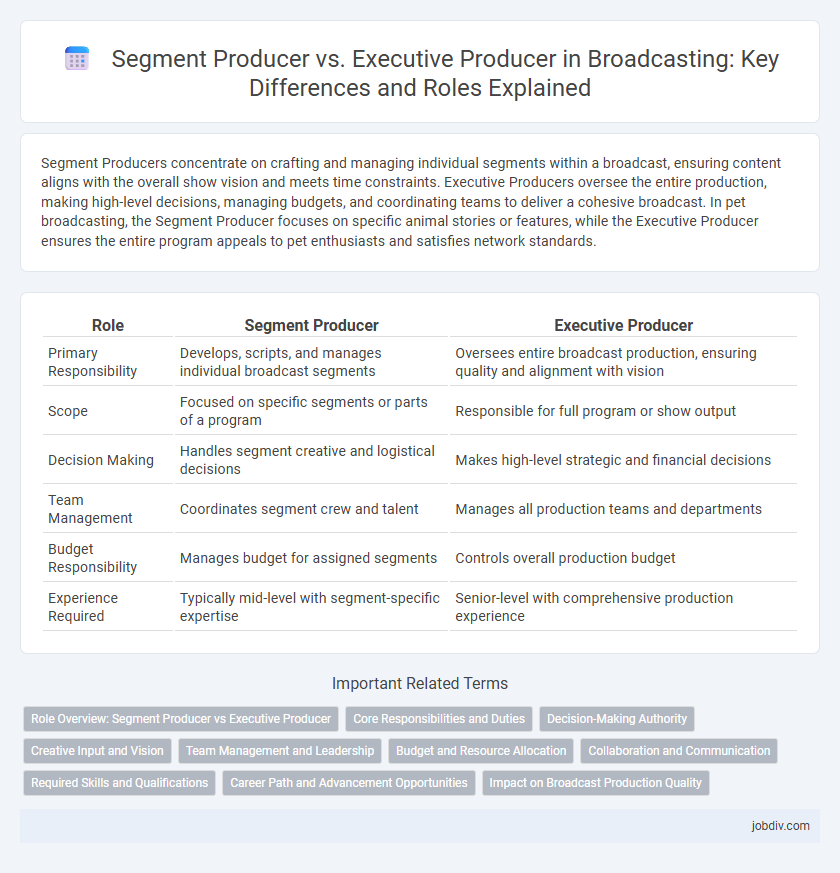Segment Producers concentrate on crafting and managing individual segments within a broadcast, ensuring content aligns with the overall show vision and meets time constraints. Executive Producers oversee the entire production, making high-level decisions, managing budgets, and coordinating teams to deliver a cohesive broadcast. In pet broadcasting, the Segment Producer focuses on specific animal stories or features, while the Executive Producer ensures the entire program appeals to pet enthusiasts and satisfies network standards.
Table of Comparison
| Role | Segment Producer | Executive Producer |
|---|---|---|
| Primary Responsibility | Develops, scripts, and manages individual broadcast segments | Oversees entire broadcast production, ensuring quality and alignment with vision |
| Scope | Focused on specific segments or parts of a program | Responsible for full program or show output |
| Decision Making | Handles segment creative and logistical decisions | Makes high-level strategic and financial decisions |
| Team Management | Coordinates segment crew and talent | Manages all production teams and departments |
| Budget Responsibility | Manages budget for assigned segments | Controls overall production budget |
| Experience Required | Typically mid-level with segment-specific expertise | Senior-level with comprehensive production experience |
Role Overview: Segment Producer vs Executive Producer
Segment producers manage the creation and coordination of specific content segments within a broadcast, overseeing scripting, talent, and timing to ensure seamless integration. Executive producers hold overall responsibility for the entire production, including budgeting, creative direction, and final approvals, ensuring the program aligns with strategic goals. The executive producer oversees multiple segment producers to maintain consistency and quality across all content segments.
Core Responsibilities and Duties
Segment Producers manage the creation and organization of specific show segments, ensuring content accuracy, timing, and coordination with on-air talent and technical crews. Executive Producers oversee the entire production process, setting the show's creative vision, budget management, and final decision-making authority on content and overall broadcast quality. Both roles require collaboration but differ in scope, with Segment Producers focusing on detailed content delivery and Executive Producers handling strategic and operational control.
Decision-Making Authority
Segment producers oversee the specific content and creative decisions within individual segments, managing day-to-day operations and ensuring alignment with the show's vision. Executive producers hold higher decision-making authority, controlling overall production direction, budget approval, and final content choices. Their strategic oversight influences the entire broadcast, while segment producers focus on tactical execution within their segments.
Creative Input and Vision
Segment Producers focus on developing specific content segments with detailed creative input, ensuring each piece aligns with the overall theme and audience engagement goals. Executive Producers maintain the overarching creative vision, guiding the narrative flow and strategic direction of the entire broadcast or production. Their role integrates multiple segments to create a cohesive, compelling final product that meets both creative standards and business objectives.
Team Management and Leadership
Segment Producers oversee the coordination of specific show sections, managing writers, editors, and technical staff to ensure content quality and timely delivery. Executive Producers lead the entire production team, setting creative vision, resolving high-level conflicts, and making strategic decisions that impact the show's overall direction. Effective team management by Executive Producers fosters collaboration across departments, while Segment Producers focus on detailed execution within their segments.
Budget and Resource Allocation
Segment producers manage budget allocation for individual segments, ensuring cost-effective use of resources within their scope. Executive producers oversee the overall budget, strategically distributing funds and resources across the entire production to maximize efficiency and quality. Their decisions directly impact cost control, resource prioritization, and the successful delivery of the final broadcast.
Collaboration and Communication
Segment Producers coordinate closely with writers, directors, and on-air talent to ensure each broadcast segment aligns with the overall show vision, focusing on detailed communication and timing. Executive Producers oversee the entire production process, facilitating collaboration among various departments to maintain consistent messaging and smooth workflow across all segments. Effective communication between Segment Producers and Executive Producers is crucial for balancing creative goals with broadcast standards and deadlines.
Required Skills and Qualifications
Segment Producers require strong storytelling abilities, proficiency in video editing software, and excellent communication skills to coordinate with talent and crew. Executive Producers demand extensive leadership experience, financial management expertise, and strategic planning capabilities to oversee production budgets and ensure overall project success. Both roles benefit from a deep understanding of broadcasting industry standards and audience analytics.
Career Path and Advancement Opportunities
Segment Producers specialize in managing specific portions of a broadcast, honing skills in content curation and team coordination that build a foundation for leadership roles. Executive Producers oversee entire productions, requiring advanced expertise in budgeting, strategic planning, and high-level decision-making, which positions them for senior management and network executive roles. Career advancement typically involves progressing from Segment Producer to Executive Producer, with opportunities expanding through demonstrated leadership, project success, and industry networking.
Impact on Broadcast Production Quality
Segment Producers directly influence broadcast production quality by managing the creative execution and ensuring content aligns with the show's vision, thus enhancing viewer engagement. Executive Producers oversee the overall production process, making strategic decisions and allocating resources that elevate the broadcast's technical and narrative standards. Their leadership and coordination optimize both the creative and operational aspects, resulting in higher-quality, cohesive programming.
Segment Producer vs Executive Producer Infographic

 jobdiv.com
jobdiv.com